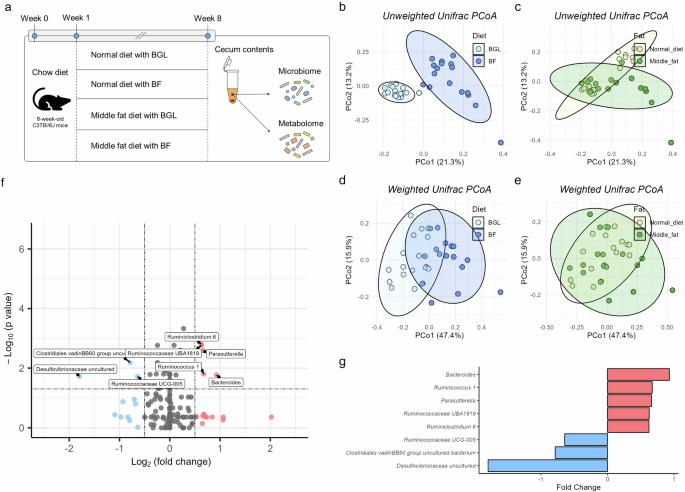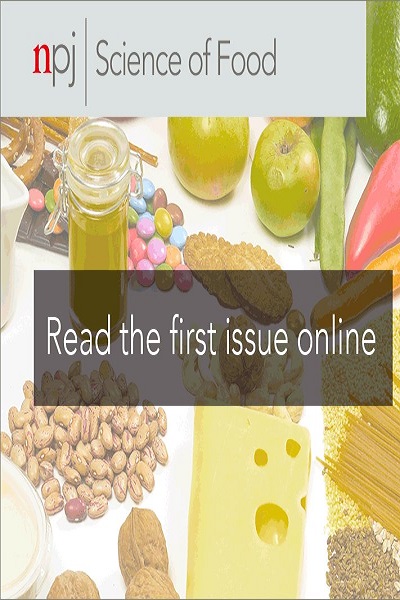食用大麦β-葡聚糖可通过增加肠道琥珀酸浓度来改善葡萄糖耐量。
IF 6.3
1区 农林科学
Q1 FOOD SCIENCE & TECHNOLOGY
引用次数: 0
摘要
大麦富含β-葡聚糖,可改变肠道微生物群和代谢组谱,从而可能影响宿主的新陈代谢。然而,大麦β-葡聚糖增加的微生物群和代谢物仍不清楚。在这项研究中,我们重点研究了肠道微生物群衍生的代谢物琥珀酸,并调查了因摄入大麦β-葡聚糖而改变的微生物群和代谢组图谱。用富含β-葡聚糖的大麦面粉或不含β-葡聚糖的大麦面粉喂养C57BL/6 J小鼠,对其肠道微生物群和代谢组图谱进行分析。结果表明,摄入大麦β-葡聚糖会增加乳酸杆菌、副乳酸杆菌和琥珀酸,这与饮食差异无关。接下来,我们使用了缺乏 slc13a2 基因的小鼠,该基因参与细胞对琥珀酸的吸收。野生型小鼠在摄入大麦β-葡聚糖后葡萄糖耐受性有所改善,但这种效果在缺乏 slc13a2 的小鼠中有所减弱。这些结果表明,摄入大麦β-葡聚糖会增加琥珀酸和琥珀酸生成菌,并影响葡萄糖代谢。本文章由计算机程序翻译,如有差异,请以英文原文为准。

Barley β-glucan consumption improves glucose tolerance by increasing intestinal succinate concentrations
Barley is rich in β-glucan, which can alter gut microbiota and metabolome profiles, potentially affecting host metabolism. However, the microbiota and metabolites increased by barley β-glucan remain unclear. In this study, we focused on the gut-microbiota-derived metabolite succinate and investigated the microbiome and metabolome profiles altered by barley β-glucan intake. C57BL/6 J mice were fed a standard or middle-fat diet containing barley flour rich in β-glucan or barley flour without β-glucan, and their gut microbiota and metabolome profiles were analyzed. The results showed increased Bacteroides, Parasutterella, and succinate due to barley β-glucan intake independent of diet differences. Next, we used mice lacking slc13a2, a gene that is involved in the cellular uptake of succinate. Wild-type mice showed improved glucose tolerance after the intake of barley β-glucan, but this effect was attenuated in the slc13a2-deficient mice. These results suggest that barley β-glucan intake increases succinate and succinate-producing bacteria and affects glucose metabolism.
求助全文
通过发布文献求助,成功后即可免费获取论文全文。
去求助
来源期刊

NPJ Science of Food
FOOD SCIENCE & TECHNOLOGY-
CiteScore
7.50
自引率
1.60%
发文量
53
期刊介绍:
npj Science of Food is an online-only and open access journal publishes high-quality, high-impact papers related to food safety, security, integrated production, processing and packaging, the changes and interactions of food components, and the influence on health and wellness properties of food. The journal will support fundamental studies that advance the science of food beyond the classic focus on processing, thereby addressing basic inquiries around food from the public and industry. It will also support research that might result in innovation of technologies and products that are public-friendly while promoting the United Nations sustainable development goals.
 求助内容:
求助内容: 应助结果提醒方式:
应助结果提醒方式:


